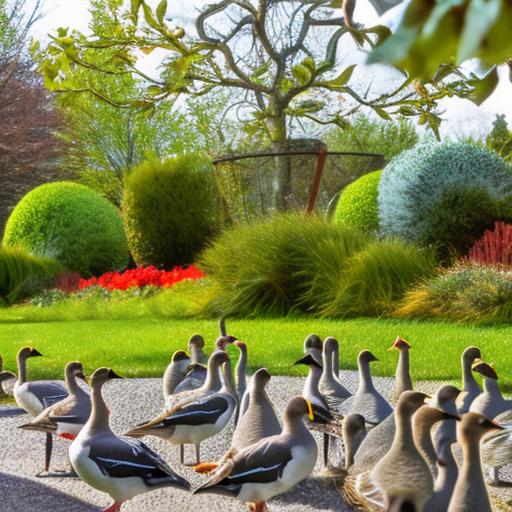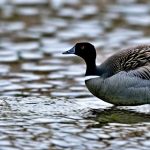Having a garden can be a source of great joy and satisfaction for many people. It is a place where they can relax, unwind, and connect with nature. However, one common problem that gardeners often face is the presence of geese in their garden. Geese can be a nuisance and cause significant damage to plants, soil, and other garden features. Dealing with geese can be frustrating and time-consuming, but it is important to find effective ways to keep them away from the garden.
Key Takeaways
- Geese can cause significant damage to gardens and crops.
- Understanding geese behavior is crucial in finding effective ways to keep them away.
- Geese can negatively impact the environment and spread diseases.
- Natural deterrents, physical barriers, scare tactics, and repellents are all effective ways to keep geese out of your garden.
- Consistent maintenance and monitoring are key to maintaining a goose-free garden.
Understanding the Behavior of Geese
To effectively keep geese away from the garden, it is important to understand their behavior and why they are attracted to gardens in the first place. Geese are naturally drawn to areas with abundant food sources, open spaces, and water. Gardens often provide all of these elements, making them an attractive destination for geese.
Geese can cause damage to gardens in several ways. They can trample on plants, eat young seedlings, and uproot vegetables. Their droppings can also be a problem as they can contaminate the soil and spread diseases. Additionally, geese may create nests in the garden, which can lead to further damage.
The Negative Impact of Geese on Your Garden
The presence of geese in the garden can have a negative impact on its overall beauty and productivity. Geese can damage plants by eating them or trampling on them. This can result in stunted growth or even death of the plants. They can also uproot vegetables and destroy flower beds.
Furthermore, geese droppings can be unsightly and create an unpleasant odor. They can also contaminate the soil with bacteria and parasites, making it unhealthy for plants to grow. In addition, geese may create nests in the garden, which can lead to further damage as they defend their territory.
Effective Ways to Keep Geese Away from Your Garden
There are several effective ways to keep geese away from the garden. These methods include natural deterrents, physical barriers, scare tactics, and repellents. The choice of method depends on the garden’s location, size, and other factors.
Natural deterrents can be used to repel geese from the garden. Certain plants, herbs, and other natural elements can be planted in the garden to discourage geese from entering. For example, planting tall grasses or shrubs around the perimeter of the garden can create a barrier that geese are less likely to cross.
Physical barriers can also be effective in keeping geese out of the garden. Fences, netting, and other physical barriers can be installed to prevent geese from entering. It is important to choose the right physical barrier based on the garden’s size and location. For example, a low fence may be sufficient for a small backyard garden, while a taller fence may be needed for a larger garden.
Scare tactics can also be used to deter geese from the garden. Decoys, noise makers, and other scare tactics can be placed in the garden to create a sense of danger and make geese feel uncomfortable. It is important to use scare tactics in a humane and safe way, without causing harm to the geese or other wildlife.
Repellents can also be effective in keeping geese out of the garden. There are both chemical and non-chemical repellents available that can effectively deter geese. It is important to use repellents in a safe and eco-friendly way, without causing harm to the environment or other animals.
Natural Deterrents for Geese in the Garden
Using natural deterrents is an eco-friendly way to keep geese away from the garden. Certain plants, herbs, and other natural elements can repel geese and discourage them from entering the garden.
One natural deterrent for geese is the use of tall grasses or shrubs around the perimeter of the garden. Geese are less likely to cross tall grasses or shrubs as they provide cover and make it difficult for geese to see potential predators.
Another natural deterrent is the use of certain plants and herbs that geese find unappealing. For example, planting marigolds, lavender, or rosemary in the garden can help repel geese. These plants have strong scents that geese do not like and will avoid.
Additionally, using reflective objects in the garden can also deter geese. Hanging shiny objects such as CDs or aluminum foil can create reflections that scare geese away. The movement and noise created by these objects can make geese feel uncomfortable and discourage them from entering the garden.
Physical Barriers to Keep Geese Out of Your Garden

Physical barriers can be an effective way to keep geese out of the garden. Fences, netting, and other physical barriers can prevent geese from entering the garden and causing damage.
Fences are a common physical barrier used to keep geese out of the garden. A fence should be at least 3 feet high to prevent geese from jumping over it. It is important to choose a fence that is sturdy and secure, as geese can be strong and persistent.
Netting can also be used as a physical barrier to keep geese out of the garden. Netting should be installed over plants or areas that are particularly vulnerable to goose damage. It is important to choose a netting with small enough holes to prevent geese from getting through.
Other physical barriers such as chicken wire or mesh can also be effective in keeping geese out of the garden. These barriers should be installed around the perimeter of the garden or around specific areas that need protection.
Scare Tactics to Keep Geese Away from Your Garden
Scare tactics can be an effective way to deter geese from the garden. Decoys, noise makers, and other scare tactics can create a sense of danger and make geese feel uncomfortable.
One scare tactic is the use of decoys. Placing decoy predators such as fake owls or coyotes in the garden can make geese think that there is a threat present and discourage them from entering. It is important to move the decoys around periodically to prevent geese from becoming accustomed to them.
Noise makers can also be used as scare tactics to keep geese away from the garden. For example, wind chimes, bells, or even a radio playing loud noises can create a sense of danger and make geese feel uncomfortable. It is important to use noise makers in a humane and safe way, without causing harm to the geese or other wildlife.
Using Repellents to Keep Geese Out of Your Garden
Repellents can be an effective way to keep geese out of the garden. There are both chemical and non-chemical repellents available that can effectively deter geese.
Chemical repellents are often used as a last resort when other methods have failed. These repellents contain substances that geese find unappealing or irritating. It is important to use chemical repellents in a safe and eco-friendly way, following the instructions on the label.
Non-chemical repellents can also be effective in deterring geese. These repellents use natural ingredients such as garlic or hot pepper to create a scent or taste that geese find unappealing. It is important to reapply non-chemical repellents regularly, especially after rain or watering.
Tips for Maintaining a Goose-Free Garden
Once you have successfully kept geese away from your garden, it is important to maintain a goose-free environment. Regular maintenance, monitoring, and other tips can help prevent geese from entering the garden.
Regular maintenance of the garden is important to keep it clean and free of attractants for geese. This includes removing fallen fruits or vegetables, cleaning up any spilled birdseed or pet food, and keeping the garden free of debris that can provide cover for geese.
Monitoring the garden for signs of geese is also important. This includes looking for tracks, droppings, or other evidence of geese in the garden. If any signs are found, it is important to take action immediately to prevent further damage.
Other tips for maintaining a goose-free garden include using motion-activated sprinklers or lights to startle geese, installing a pond aerator to discourage geese from landing in water features, and using bird netting to protect vulnerable plants or areas.
Enjoying a Beautiful and Productive Garden Without Geese
Dealing with geese in the garden can be frustrating and time-consuming. However, by understanding their behavior and using effective methods to keep them away, it is possible to enjoy a beautiful and productive garden without the hassle of dealing with geese. Whether it is using natural deterrents, physical barriers, scare tactics, or repellents, finding the right method for your garden’s needs is crucial. By being consistent and proactive in keeping geese away from the garden, you can create a peaceful and enjoyable space for yourself and your plants.
If you’re struggling to keep geese out of your garden, you might find this article on “What is the Incubation Period for Goose Eggs?” helpful. It provides valuable insights into the breeding and incubation process of geese, which can help you understand their behavior better and find effective ways to deter them from your garden. Check out the article here for more information.
FAQs
What are the common problems caused by geese in gardens?
Geese can cause damage to plants, flowers, and vegetables in gardens. They can also leave droppings that can be unsightly and unsanitary.
What are some effective ways to keep geese out of gardens?
Some effective ways to keep geese out of gardens include using physical barriers such as fences or netting, using decoys or scare tactics, and planting vegetation that geese do not like.
What are some plants that geese do not like?
Geese do not like plants with strong scents or tastes such as lavender, rosemary, and thyme. They also tend to avoid plants with prickly leaves or stems such as holly and barberry.
Are there any humane ways to deter geese from gardens?
Yes, there are many humane ways to deter geese from gardens. These include using noise makers, such as wind chimes or bells, or using motion-activated sprinklers that spray water when geese approach.
Is it legal to harm or kill geese that are causing problems in gardens?
In most cases, it is illegal to harm or kill geese that are causing problems in gardens. It is important to check with local authorities to determine the laws and regulations in your area.
Meet Walter, the feathered-friend fanatic of Florida! Nestled in the sunshine state, Walter struts through life with his feathered companions, clucking his way to happiness. With a coop that’s fancier than a five-star hotel, he’s the Don Juan of the chicken world. When he’s not teaching his hens to do the cha-cha, you’ll find him in a heated debate with his prized rooster, Sir Clucks-a-Lot. Walter’s poultry passion is no yolk; he’s the sunny-side-up guy you never knew you needed in your flock of friends!







